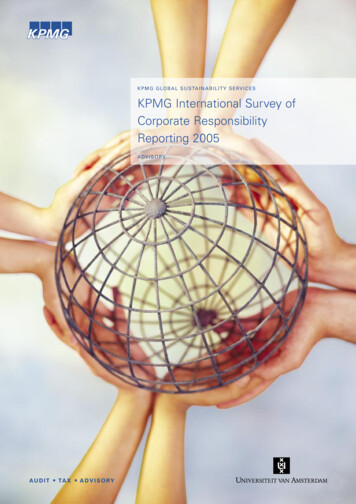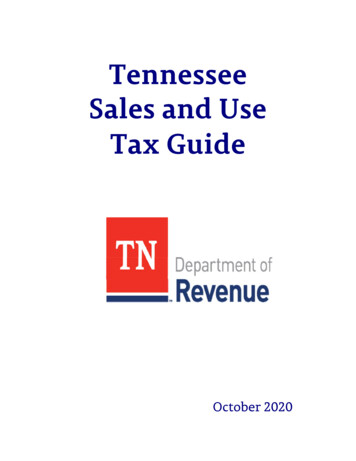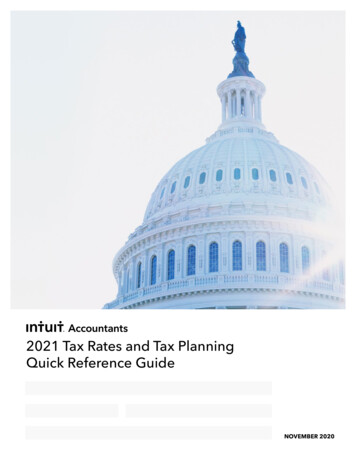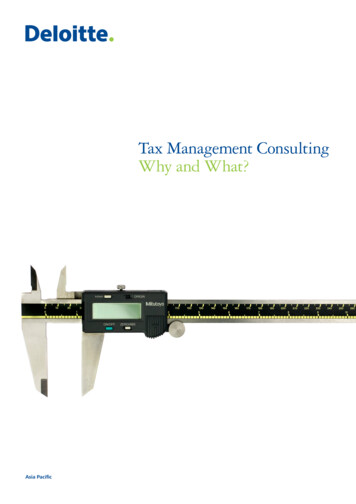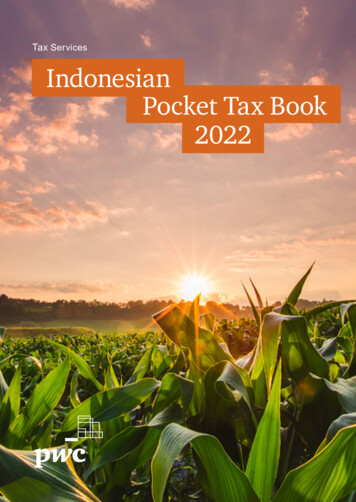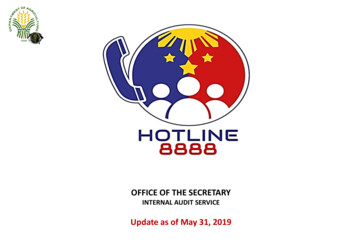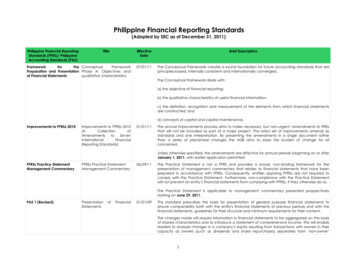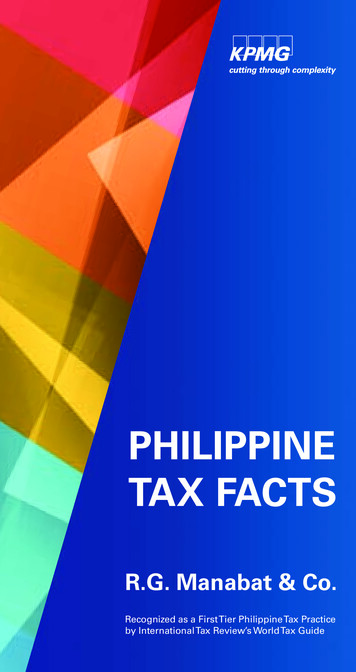
Transcription
PHILIPPINETAX FACTSR.G. Manabat & Co.Recognized as a First Tier Philippine Tax Practiceby International Tax Review’s World Tax Guide
Corporate TaxR.G. Manabat & Co.Recognized as a First Tier Philippine Tax Practiceby International Tax Review’s World Tax Guide
R.G. Manabat & Co.Corporate TaxCORPORATE INCOME TAXDomestic corporations(on all income whetherfrom within or outsidethe Philippines)Resident foreigncorporations (on allPhilippine-sourcedincome)Tax rate30% of gross incomeNon-resident foreigncorporations or NRFCs (on allPhilippine-sourced income)Regular corporate income tax (RCIT)30% of taxable incomeMinimum corporate income tax (MCIT) beginning on the 4 th taxable year immediatelyfollowing the year in which the corporation commenced its business operations, whenthe MCIT is greater than the RCIT2% of the gross incomeImproperly accumulated earnings tax (IAET). This is imposed when the accumulatedearnings of a corporation are in excess of 100% of the paid up capital.10% of the improperlyaccumulated taxableincomeThe IAET does not apply to listed corporations, banks and non-bank financialintermediaries, insurance companies, companies registered with the PhilippineEconomic Zone Authority (PEZA), or pursuant to the Bases Conversion DevelopmentAuthority (BCDA), or other special economic zones.SPECIAL INCOME TAX RATES (selected transactions)Regional or area headquarters (RHQ)Income derived by a depository bank under the expanded foreign currency depositExemptRCIcurrency transactions with nonresidents, offshore banking(FCD) systemfromfromforeignfrom localRCI commercial banks including branches of foreign banks andunits in theExemptPhilippines,other depository banks under the FCD system, unless otherwise specified by theSecretary of FinanceDomestic and resident foreign corporations registered with the Board ofInvestments (BOI)Renewable energy projects and activities under the Renewable Energy ActResident foreign international carriers (air and shipping) whose countries are signatoriesto tax treaties or international agreements granting exemptions from income tax, towhich the Philippines is a signatoryDomestic and resident foreign corporations registered with the PEZA, or under theother special economic zones (Aurora Special Economic Zone Authority, Authority ofthe Freeport Area of Bataan, Cagayan Special Economic Zone Authority, and ZamboangaCity Special Economic Zone Authority)Domestic and resident foreign corporations registered pursuant to the BCDA(encompassing the Subic Bay Metropolitan Authority, the Clark DevelopmentCorporation, and other converted US military bases authorities)Interest income from foreign currency loans granted by depository banks under the FCDsystem to residents other than offshore banking units in the Philippines or otherdepository banks under the FCD systemRegional operating headquarters (ROHQ)Proprietary educational institutions and hospitals, when gross income from unrelatedtrade, business or other activity does not exceed 50% of the total gross incomederived by such educational institutions or hospitals from all sourcesTax rateExempt from RCITExempt from RCITExempt from RCIT for theperiod of the income taxholiday (ITH) for 4 or 6 yearsExempt from RCIT for theperiod of ITH (7 years).Afterwards, 10% of taxableincome.Exempt from RCITExempt from RCIT forperiod of ITH for 4 or 6years. Afterwards, 5% ofmodified gross income5% of modified grossincome10% of taxable income10% of taxable income10% of taxable incomeFINAL WITHHOLDING TAX (also see primer on Avoidance of Double Taxation)The final withholding tax (FWT) is the full and final payment of income tax due from the recipient of the income. Theobligation to withhold the tax is imposed by law on the payor of the goods or service. Only payments specified in theConsolidated Withholding Tax Regulations are subject to FWT. The rate of FWT varies from 6% to 30%, as shown inselected examples below:FWT RatePayments to citizens, resident alien individuals, and domestic corporationsDividends received by an individual from a domestic corporationDividends received by domestic corporations from other domestic corporationsInterest from any peso bank deposit, and yield or any other monetary benefit fromdeposit substitutes and from trust funds and similar arrangements10%Exempt20%Interest income received/derived from a depository bank under the FCD system7.5%Payments to non-resident alien individuals engaged in trade or business in the PhilippinesCash and/or property dividends from a domestic corporation20%Interests from any currency bank deposit and yield or any other monetary benefit fromdeposit substitutes and from trust funds and similar arrangementsPayments to non-resident alien individuals not engaged in trade or business in the PhilippinesGross amount of income derived from all sources within the Philippines such as interest, cashand/or property dividends, rents, salaries, wages, premiums, annuities, compensation,remuneration, emoluments, or other fixed or determinable annual or periodic or casual gains,profits and income and capital gains25%15%Gross income received by every alien individual and Filipino (subject to certainconditions) occupying managerial or technical positions in RHQs/ROHQs andrepresentative offices established in the Philippines by multinational companies, assalaries, wages, annuities, compensation, remuneration, and other emoluments, suchas honoraria and allowances, except income which is subject to the fringe benefits taxPayments to resident foreign corporationsDividends received from domestic corporationsExemptPayments to NRFCsGross income derived from all sources within the Philippines such as interests,dividends, rents, royalties, salaries, premiums (except reinsurance premiums), annuities,emoluments, or other fixed or determinable annual, periodic or casual gains, profitsand income and capital gains (except capital gains realized from the disposition ofshares of stock in any domestic corporation)Profit remitted by the Philippine branch of a foreign corporation to its head office abroadbased on the total profits applied or earmarked for remittance without any deduction forthe tax component except those registered with the PEZA and other companies withinthe special economic zonesCash and/or property dividends30%15%30% in general. May belowered to 15% if thecountry of the recipientallows a credit againstthe tax due from theNRFC on taxes deemedpaid in the PhilippinesCREDITABLE WITHHOLDING TAXThe creditable withholding tax (CWT) is intended to equal or at least approximate the tax due from the recipient of theincome. The obligation to withhold the tax is imposed by law on the payor of the goods or service. Only paymentsspecified in the Consolidated Withholding Tax Regulations are subject to CWT. The rate of CWT varies from 1% to20%, as shown in chosen examples below:CWT rateOn one-half (1/2) of the gross amounts paid by any credit card company in thePhilippines to any business entity, whether natural or juridical person, representing thesales of goods/services made by the aforesaid business entity to cardholdersCertain payments made by the top 20,000 corporations (as determined by the Bureauof Internal Revenue or BIR) to its regular suppliers of goods and/or servicesPayments to certain contractors (general building, engineering, specialty and others)Ordinary rental of real property, and/or the ordinary rental of personal property in excessof P10,000.00 rental payments annuallySale of real property classified as an ordinary asset (varying rates depending on whetherthe seller is habitually engaged in the real estate business, and on the price of the realproperty sold by said seller)Professional, promotional and talent fees rendered by certainindividuals/professionals/corporations where the gross income of the recipient exceedsP720,000.00 for the current yearInterest income derived from other debt instruments not within the coverage of“deposit substitutes” under specific laws or regulations1%1%for goods2%for services2%5%1%, 3%, 5%,or 6%15%. Otherwise 10% ifgross income is less thanP720,000.0020%CAPITAL GAINS TAX (CGT) (also see primer on Avoidance of Double Taxation)Tax rate6%On capital gains presumed to have been realized from the sale exchange or other dispositionof real property located in the Philippines and that are classified as capital assetsOn the net capital gains from the sale of shares of stock in a domestic corporation not traded5% if net capitalin the stock exchangegains is not overP100,000.00(For sale or other disposition of shares of stock listed and traded through the local stock10% on anyexchange other than the sale by a dealer in securities, a tax at the rate of 1/2 of 1% of theamount in excessgross selling price or gross value in money of the shares of stock is imposed, which shallof P100,000.00be paid by the seller or transferor)VALUE-ADDED TAX (VAT)Any sale, barter, exchange, lease of goods or properties, rendering of services, andimportation of goods done in the course of trade or business by domestic and residentforeign corporations, and on services rendered in the Philippines by NRFCs.Examples of zero-rated sales: (a) export sales, (b) foreign currency denominated sales,(c) sales to persons or entities whose exemption under special laws or internationalagreements to which the Philippines is a signatory effectively subjects such sales to zero rate,and other sales and servicesExamples of VAT-exempt sales: (a) services subject to percentage tax, (b) services of banks,non-bank financial intermediaries performing quasi-banking functions, and other non-bankfinancial intermediaries, (c) services rendered by regional or area headquarters establishedin the Philippines by multinational corporations which act as supervisory, communicationsand coordinating centers for their affiliates, subsidiaries or branches in the Asia PacificRegion and do not earn or derive income from the Philippines, (d) transactions which areexempt under international agreements to which the Philippines is a signatory or underspecial laws, (e) transport of passengers by international carriers, and (f) other salesand servicesTax rate12%0%ExemptDOCUMENTARY STAMP TAX (selected transactions)Tax rateOriginal issuance of shares P1.00 on each P200.00, or fractional part thereof, of the par value, of such shares of stock:Secondary or subsequent P0.75 on each P200.00, or fractional part thereof, of the par value of such stock: In the case ofdisposition of sharesstock without par value the amount of the documentary stamp tax shall be equivalent totwenty-five percent (25%) of the documentary stamp tax paid upon the original issue of saidstock.Debt instrumentsP1.00 on each P200.00, or fractional part thereof, of the issue price of any such debtinstruments. For debt instruments with terms of less than one (1) year, the documentary stamptax shall be of a proportional amount in accordance with the ration of its term in number of daysto three hundred sixty-five (365) days. Only one documentary stamp tax shall be imposed oneither loan agreement, or promissory notes issued to secure such loan.Deeds of sale andconveyances of realpropertiesP15.00 for the first P1,000.00. For every additional P1,000.00, or fractional part thereof in excessof P1,000.00 of such consideration or value, P15.00.
Individual TaxR.G. Manabat & Co.Recognized as a First Tier Philippine Tax Practiceby International Tax Review’s World Tax Guide
R.G. Manabat & Co.Individual TaxINCOME TAX RATES1. Resident Citizens2. Non-Resident Citizens3. Resident Aliens4. Non-Resident Aliens Engaged in Trade or BusinessIf Taxable Income is: (PHP)OverTax Due (PHP)plusof the excess over (PHP)-but not ECIAL TAX RATES ON ALIENSTaxpayerNon-Resident Aliens Not Engaged in Trade orBusiness within the PhilippinesEmployees of Regional or Area Headquartersand Regional Operating Headquarters ofMultinational CompaniesEmployees of Offshore Banking UnitsEmployees of Petroleum Service Contractorsand SubcontractorsConditionsPhysical presence in the Philippines of 180 daysor less in any calendar year.The same tax treatment shall apply to Filipinosemployed and occupying the same positions asthose aliens employed. Revenue Regulations No.11-2010 requires that the Filipino be amanagerial or highly technical employeereceiving at least the mandated compensation.The same tax treatment shall apply to Filipinosemployed and occupying the same positions asthose aliens employed.Rate25%15%EXCLUSIONS FROM GROSS INCOMEDE MINIMIS BENEFITSMonetized unused vacation leave credits ofprivate employeesMonetized value of vacation and sick leavecredits paid to government officials andemployeesLimit10 days during the yearMedical cash allowance to dependents ofemployeesRice subsidyUniform and clothing allowanceP750 per employee per semester or P125 permonthP1,500 per monthP5,000 per annumActual medical assistanceP10,000 per annumLaundry allowanceP300 per monthEmployees achievement awardsP10,000 per annumGifts given during Christmas and majoranniversary celebrationsDaily meal allowance for overtime work andnight/graveyard shiftP5,000 per employee per annumBenefits received by an employee by virtueof a collective bargaining agreement (CBA)and productivity incentive schemes 1P10,000 per employee per annum13th MONTH PAY AND OTHER BENEFITS 2Other benefits such as incentives and Christmas bonusnot exceeding P82,000 a year. Any amount in excess ofP82,000 shall be taxable.None25% of the basic minimum wage on a perregion basisALLOWABLE DEDUCTIONSBenefitLimitPersonal ExemptionAdditional ExemptionOptional Standard DeductionPremium Payments on Health and/orHospitalization InsuranceP50,000 for the taxpayerP25,000 per qualified dependent up to 440% of gross incomeP2,400 for the taxpayer whose family gross income does notexceed P250,000 for the taxable yearSTATUTORY CONTRIBUTIONSGovernment AgencySocial Security System (SSS)3Philippine Health Insurance Inc. (PHIC)4Home Development Mutual Fund (HDMF)512345Income Bracket per EmployerEmployeemonth (PHP)Contribution (PHP) Contribution (PHP)Over 15,7501,208.70581.30Over 35,000Over 5,000As amended by Revenue Regulations No. 1-2015As amended by Republic Act No. 10653Effective January 1, 2014 per SSS Circular No. 2013-10VEffective January 1, 2014 per PhilHealth Circular No. 027, s.2013Per Rule VI Section 1 of Implementing Rules and Regulations of Republic Act No. 9679437.50100.00437.50100.00
Avoidance of DoubleTaxation AgreementsR.G. Manabat & Co.Recognized as a First Tier Philippine Tax Practiceby International Tax Review’s World Tax Guide
R.G. Manabat & Co.Avoidance of DoubleTaxation nadaChina17Czech onesiaIsraelItalyJapanKorea, SouthKuwaitMalaysiaNetherlandsNew gaporeSpainSwedenSwitzerlandThailandUnited ArabEmiratesUnited KingdomUnited States ofAmerica (USA)VietnamQualifying Companies(%)Interests2(%)Royalties(%)Capital GainsTaxExemption 10151310311512.5 10121515NoNOTESOn 19 August 2013, the Philippine Supreme Court ruled that the requirement of prior Tax Treaty Relief Application (TTRA) to avail of tax treatyrates may be dispensed with since a tax treaty takes precedence over an administrative issuance. However, the BIR has not yet formallyamended its requirement for the filing of the TTRA with the BIR’s International Tax Affairs Division (ITAD) prior to the occurrence of the firsttaxable event to enjoy the benefits of the tax treaty.2This column does not include exemptions provided under the treaties on certain types of interest such as interest paid to governments, etc.3The 15% rate applies where relief, either by rebate or credit under Article 24 of the treaty is given to the beneficial owner of the dividends.4The 10% rate applies to interest arising in the Philippines from publicly issued bonds, debentures or similar obligations.5The 15% rate applies to royalties paid by an enterprise registered with the Philippine Board of Investments (BOI) and engaged in preferredareas of activities. For the USA, the treaty provides a most-favored-nation clause.6The treaty provides certain conditions to be met before the exemption can be applied.7The 10% rate applies if the beneficial owner is a company that holds directly at least 10% either of the voting shares of the company payingthe dividends or of the total shares issued by that company during the period of six months immediately preceding the date of payments of thedividends. For Japan, the 10% rate also applies to dividends paid by an enterprise registered with the BOI and engaged in preferred areas ofactivities.8The 10% rate applies to interest arising in the Philippines from publicly issued bonds, debentures or similar obligations. The 10% rate likewiseapplies to interest paid by an enterprise registered with the BOI and engaged in preferred areas of activities.9The 10% rate applies to royalties paid by an enterprise registered with the BOI and engaged in preferred areas of activities.10The 10% rate applies if the beneficial owner is a company that holds directly at least 10% of the capital of the paying company. Except forBelgium, China and Czech Republic, the treaties exclude partnership. For France and Spain, the rate applies to voting shares (vis-à-vis capital).11The 15% rate applies if arising from the use of, or the right to use, any copyrighted work including cinematograph films or tapes for televisionor broadcasting while the 10% rate applies in all other cases. For China and Germany, the 10% rate applies to royalties arising from the use of,or the right to use, any patent, trade mark, design or model, plan, secret formula or process, or from the use of, or the right to use, industrial,commercial, or scientific equipment, or for information concerning industrial, commercial or scientific experience. Further, for technologytransfers which are subject to approval under Philippine law, the contract giving rise to such royalties must be approved by the Philippinecompetent authorities.12The 10% rate applies if the beneficial owner is a company (excluding partnerships) that holds directly at least 25% of the capital of the payingcompany. For Germany, the rate applies to ownership (vis-à-vis holding).13The 15% rate applies if the beneficial owner is a company. For Brazil, it includes a partnership.14The 25% rate applies to royalties arising from the use or the right to use trade marks and cinematograph films, films or tapes for television orradio broadcasting.15For Canada, the 15% rate applies if the company controls at least 10% of the voting power of the company paying the dividend. For Norwayand the United Kingdom, the rate applies if the beneficial owner is a company that controls directly or indirectly at least 10% of the votingpower in the company paying the dividends. For Finland, the 15% rate applies if the recipient is a company (excluding partnership) owning atleast 10% of the voting stock of the company paying the dividends. For India, the 15% rate applies if the beneficial owner is a company thatowns at least 10% of the shares of the company paying the dividends.16The treaty provides a most-favored-nation clause.17The treaty does not cover Hong Kong and Macau.18The 10% rate applies to royalties arising from the use of, or the right to use, any copyrighted work (other than royalties arising from the use of,or the right to use, any copyright of cinematograph films, and films or tapes for television or radio broadcasting as 15% rate applies to thesame), any patent, trade mark, design or model, plan, secret formula or process, or from the use of, or the right to use, industrial, commercialor scientific equipment, or for information concerning industrial, commercial or scientific experience.19The 15% rate applies to royalties paid by an enterprise registered with and engaged in preferred areas of activities, and also royalties inrespect of cinematographic films or tapes for television or broadcasting, and royalties for the use of, or the right to use, any copyrighted work.20The 10% rate applies if such interest is paid in connection with the sale on credit of any industrial, commercial or scientific equipment, or onany loan of whatever kind granted by a bank (including other financial institutions for Netherlands), or on publicly issued bonds, debentures orsimilar obligations.21The 15% rate applies if the beneficial owner is a company that holds directly at least 25% of the capital of the paying company.22The 10% rate applies if the interest is received by a financial institution (including insurance companies). The same applies to interest arisingfrom publicly issued bonds, debentures or similar obligations.23The 15% rate applies to royalties paid by an enterprise which is registered with the BOI.24The 15% rate applies if the beneficial owner is a company that owns at least 25% of the capital of the company paying the dividends.25The 15% rate applies if the recipient is the beneficial owner of the interest. However, interest arising in a Contracting State and paid to aresident of the other Contracting State shall be taxable only in the other State, if the interest is paid in respect of (i) a bond, debenture or othersimilar obligation of the government of that State or a political subdivision or local authority thereof; or (ii) a loan made, guaranteed or insured,or a credit extended, guaranteed or insured by the Central Bank of the Philippines (BSP), or the "Bank Indonesia" (the Central Bank of Indonesia),or any other lending institution, as may be specified and agreed in letters exchanged between the competent authorities of the ContractingStates.26The 15% rate applies to royalties paid by an enterprise registered with the BOI and engaged in preferred areas of activities.27The 15% rate applies to royalties paid by an enterprise registered with the BOI and engaged in preferred areas of activities and also toroyalties on cinematographic films or tapes for television or broadcasting.28The 15% rate applies if the royalties are paid in respect of the use of or the right to use cinematograph films and films or tapes for radio ortelevision broadcasting.29The 10% rate applies if the beneficial owner is a company (other than a partnership) that holds directly at least 25% of the capital of thecompany paying the dividends. The rate also applies to dividends paid by enterprises registered with the BOI and engaged preferred pioneerareas of investment.30The 15% rate applies if paid by a registered enterprise as well as royalties from the use of, or the right to use, cinematograph films, or tapesfor radio or television broadcasting.31The 10% rate applies if the recipient is a company the capital of which is wholly or partially divided into shares and which holds directly atleast 10% of the capital of the company paying the dividends.32The 25% rate generally applies to royalties including rental and those paid for the use of, or the right to use, motion picture films, films ortapes for radio or television broadcasting. The 7.5% rate applies to gross rentals or amount paid for the use of or the right to use containers.Further, this treaty provides a most-favored-nation clause. Moreover, the 10% rate applies to royalties paid by a company registered with theBOI and engaged in preferred pioneer areas of investment.33The 15% rate applies if the beneficial owner is a company (excluding partnership) which holds directly at least 25% of the capital of the payingcompany during the part of the paying company's taxable year which precedes the date of payment of the dividends and during the whole of itsprior taxable year, if any.34The 10% rate applies if the recipient is a company (excluding partnership) and during the part of the paying corporation’s taxable year whichprecedes the date of payment of the dividends and during the whole of its prior taxable year (if any), owns at least 25% of the outstandingshares of the voting stock of the paying corporation.35The 10% rate applies if the royalties are paid by an enterprise registered with the BOI and engaged in preferred pioneer areas of activities. The15% rate applies if royalties are, in respect of cinematographic films and tapes for television of broadcasting. The 25% rate applies in all othercases.36The 15% rate applies if the recipient is a company (including partnership) and during the part of the paying company's taxable year whichprecedes the date of payment of the dividend and during the whole of its prior taxable year (if any), owns at least 15% of the outstandingshares of the voting stock of the paying company.37The 15% rate applies where the royalties are paid by an enterprise registered with the BOI and engaged in preferred areas of activities andalso royalties in respect of cinematographic films or tapes for television or broadcasting.38The 10% rate applies where the royalties are paid by an enterprise registered with the BOI and engaged in preferred areas of activities. The20% rate applies in respect of cinematographic films or tapes for television or broadcasting. The 15% rate applies in all other cases.39The 15% rate applies if the company paying the dividends is a Philippine company engaged in an industrial undertaking.40The 20% rate applies when the recipient is a corporation and during the part of the paying corporation's taxable year which precedes the dateof payment of the dividend and during the whole of its prior taxable year (if any), owns at least 10% of the outstanding shares of the votingstock of the paying corporation.1
Contact usR.G. Manabat & Co.Manila - Head Office9/F KPMG Center6787 Ayala AvenueMakati City 1226, Metro ManilaTelephone 63 (2) 885 7000Fax 63 (2) 894 1985E-mailph-inquiry@kpmg.comkpmg.com.ph 2015 R.G. Manabat & Co., a Philippine partnership and a member firm of the KPMGnetwork of independent firms affiliated with KPMG International Cooperative ("KPMGInternational"), a Swiss entity. KPMG International provides no client services. No memberfirm has any authority to obligate or bind KPMG International or any other member firmvis-à-vis third parties, nor does KPMG International have any such authority to obligateor bind any member firm. All rights reserved.Printed in the Philippines.The information contained herein is of a general nature and is not intended to addressthe circumstances of any particular individual or entity. Although we endeavor to provideaccurate and timely information, there can be no guarantee that such information is accurateas of the date it is received or that it will continue to be accurate in the future. No one shouldact on such information without appropriate professional advice after a thorough examinationof the particular situation.The KPMG name, logo and “cutting through complexity” are registered trademarksor trademarks of KPMG International.
PHILIPPINE TAX FACTS R.G. Manabat & Co. Recognized as a First Tier Philippine T
